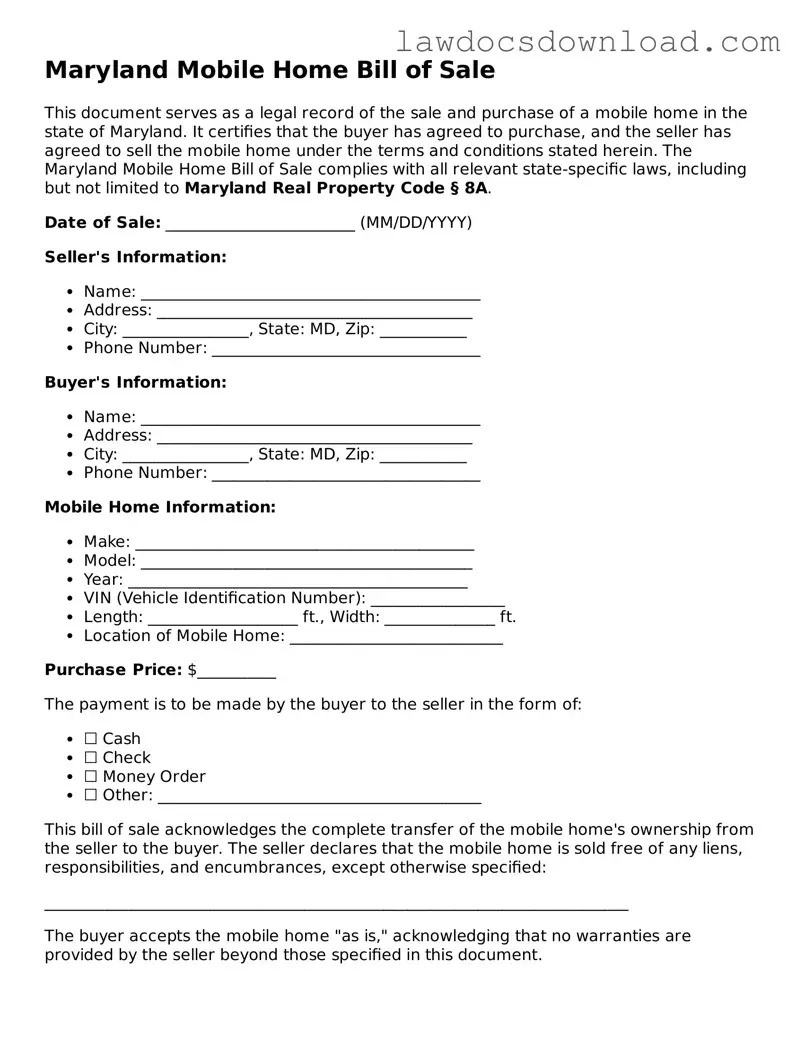The Maryland Mobile Home Bill of Sale form shares similarities with the Vehicle Bill of Sale. Both documents serve as a record of sale and transfer ownership from the seller to the buyer. This formal acknowledgment includes essential information like the make, model, and identification number, as well as buyer and seller details, ensuring the transaction is transparent and legally binding. This serves to protect both parties in case of future disputes.
Similar to the Real Estate Bill of Sale, the Maryland Mobile Home Bill of Sale form records the transaction of a significant asset. Although one pertains to movable living spaces and the other typically to fixed property, they both function to confirm the sale's details, including the parties involved, the sale amount, and the property description. These documents are paramount in establishing new ownership and can be crucial for tax and legal purposes.
The Equipment Bill of Sale is another document that bears resemblance to the Maryland Mobile Home Bill of Sale form. It's used for the sale of items like machinery or office equipment, detailing the specifics of the transaction to ensure clarity. Both forms outline the transferred item's condition, sale price, and identification details, offering a legal safeguard that records the transfer of ownership. This process is vital for both inventory management and financial record-keeping.
A Boat Bill of Sale and the Maryland Mobile Home Bill of Sale form also share commonalities. Both are necessary for transactions that transfer ownership of valuable assets requiring registration with specific state agencies. These documents must include crucial information like the asset's description, the agreement terms, and the parties' details. They are instrumental in the registration process, helping to establish legal ownership and facilitate the asset's proper transfer.
The Firearm Bill of Sale is akin to the Maryland Mobile Home Bill of Sale in that it is used to document the sale and transfer of ownership of a specific item. For firearms, this documentation is particularly important due to the legal requirements surrounding firearm ownership and transfer. Both documents detail the transaction's specifics, including the seller, buyer, and item description, providing a legal venue for transferring ownership responsibly.
Like the Maryland Mobile Home Bill of Sale, a General Bill of Sale is used for a wide range of personal property sales, from electronics to furniture. It acts as a receipt for the transaction, outlining the terms of the sale, identifying the involved parties, and describing the items sold. This breadth of use shows the flexibility of bill of sale documents in providing a legal framework for private sales transactions, regardless of the item's nature.
Artwork Bill of Sale can be comparable to the Maryland Mobile Home Bill of Sale form, particularly in their role in facilitating ownership transfers of valuable assets. An Artwork Bill of Sale documents the sale of artwork, providing details such as the artist’s name, the piece's description, and provenance. Both documents serve to establish a clear record of the transaction, critical for insurance, taxation, and provenance verification purposes.
The Business Bill of Sale and the Maryland Mobile Home Bill of Sale form are alike in that they both record the sale of significant investments. A Business Bill of Sale covers the transaction details when someone buys or sells a business, including assets and liabilities. Both forms are crucial for the clear transfer of ownership and for record-keeping purposes, aiding in the smooth transition of control and ensuring all legal requirements are met.
Pet Bill of Sale is another document similar to the Maryland Mobile Home Bill of Sale form. It is specifically used for the sale and transfer of ownership of animals, typically pets. The document outlines the breed, health condition, and any specific details of the animal, alongside the terms of the sale. Both forms function to protect the parties involved by clearly defining the terms of the agreement, ensuring a smooth and transparent transaction process.

